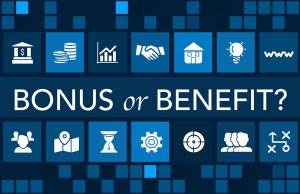A new study from the Reward & Employee Benefits Association indicates that employee engagement is considered a top strategic priority for 2016 (35.6% of respondents indicated this as number 1).
So how do we get employees engaged? Employee rewards.
Employee rewards are a critical part of total employee compensation, and also play an important role in boosting employee engagement rates. But are employee rewards considered a bonus or formal employee benefit? U.K. based publication, The HR Director, has an innovative stance on how employee rewards should be viewed, evaluated and posed to employees. Traditionally, rewards have been viewed as bonuses. They have been viewed as something that require employees to exhibit continued exceptional behavior, not something that employees come to expect from their employer. Initial reward programs began with old-fashioned recognition for things like anniversary of hire, or the giving of crystal plaques and watches. Programs have since progressed to offering employee rewards that come in a variety of forms and are given like a benefit, which by definition is something that employers owe employees as a part of their employment. Smaller and timelier rewards can now come in the form of cash, as an addition to the employee’s base pay, gift cards or extra vacation time.
So as employee rewards evolve, should they become a benefit, as they have been more recently with the way healthcare and basic life insurance is? Is employee recognition that important?
The HR Director is suggesting that in terms of pay structure employers should consider rewards an inextricable part of employee compensation. So much so that they are budgeted as benefits, and included in total employee compensation. To structure pay in this way would essentially guarantee employees receive rewards. Instead of being an added income, rewards would become a given, with low performing employees getting reductions in income, rather than high performing employees getting added incentives.
So is that going back to a “stick” method of rewards, rather than using the proven “carrot” method? While employee recognition and employee engagement are critically important to organization production and employee satisfaction, personally, I’m not convinced that rewards shouldn’t stay a value add, separate from the benefits given to all employees. Thoughts? Leave us a comment?











.png?width=600&height=600&name=3D8DC522-2245-490E-AA26-63567A199A4C%20.png)